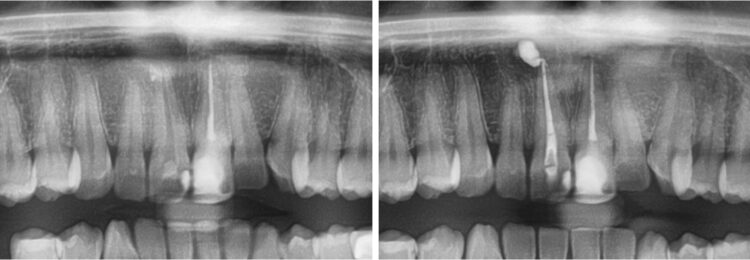What are the Applications in the Field of Endodontics?
What does Endodontics mean?
Endodontics; is the area of expertise related to the treatment of root canals in teeth. In the inner part of the teeth, there is a section called “pulp”, which extends to the end of the tooth roots, consisting of veins and nerves that provide the vitality of the tooth. This part can become inflamed due to bruises, cracks and fractures. After this section is cleaned and disinfected with various chemicals, it must be filled with special filling materials. This treatment is called root canal treatment.
How long is root canal treatment? How many times do I have to come for treatment?
How many sessions of root canal treatment will take depends on the severity of the tooth’s disease. Root canal treatment can be performed in a single session (45 minutes-1 hour) for non-inflamed teeth. If there are inflamed, very painful teeth, swelling on the face or neck due to inflammation, or similar conditions that will prolong the treatment period, this period and the number of sessions may increase. However, the second and subsequent sessions are generally shorter in duration.
What happens if root canal treatment is not done?
Severe toothache is the most common condition in teeth requiring root canal treatment. After a while, the pain can be relieved as the pulp loses its vitality. However, the infection progresses without causing any pain and causes inflammation in the bone around the tooth. Root canal treatment should not be neglected because the pain is reduced or gone. The elapsed time not only reduces the chance of success in root canal treatment, but also causes the healing to take longer.
Why can't I have my tooth extracted?
Some patients think that if I do not have a root canal treatment and have my tooth pulled, it would be better if a bridge or implant was made instead. No prosthesis can fully replace a natural tooth. By examining an endodontist, you can get more accurate information about whether your tooth should be extracted or not.
Can the root canal treatment of more than one tooth be finished in the same session?
Root canal treatment is a laborious and sensitive treatment that requires at least one session for a tooth. Especially in molars in the posterior region, only one tooth can be treated in one session. However, in some cases, root canal treatment can be applied to more than one tooth in the same session in the teeth in the anterior region that need root canal treatment.
Will I feel discomfort during the treatment? Will I have pain? Will my pain go away immediately?
Local anesthesia is applied during the treatment. There is usually no discomfort or pain during root canal treatment. In very rare cases, a little pain may be felt, in this case, additional anesthesia methods are used and the treatment process continues painlessly. Rarely, a little pain or slight sensitivity when pressing on the tooth may occur after root canal treatment. This is a normal pain that occurs after root canal treatment.
Do I need to use medication after treatment?
Only follow your doctor’s advice on drug use.
When can I eat or drink after treatment?
Under normal circumstances, it is recommended not to chew anything after root canal treatment until the effect of anesthesia wears off, that is, until the numbness disappears. Because there is a risk of biting your lip, cheek or tongue that is numbed with the tooth. In addition, the type of filling material applied to your teeth is also important. In temporary fillings, it is generally recommended that you do not eat or drink anything for at least 2 hours. If your tooth has amalgam filling, it is recommended that you do not chew for 2 hours in the same way. You can have a drink when necessary.
How long is the life of the tooth treated with root canal?
Root canal treatment is a treatment to prevent tooth extraction. As a result of a root canal treatment performed under appropriate conditions, the tooth can function in the mouth for a lifetime.
What is the success rate of root canal treatment? What happens to that tooth after unsuccessful treatments?
Root canal treatment is a treatment with a very high success rate. A specialist in endodontics, accurate diagnosis and treatment planning, high quality of materials used during treatment, patient compliance and good oral care bring this success closer to 100%. In addition, unsuccessful root canal treatments that are not performed under appropriate conditions have a chance to be renewed.
Our Doctors

Assoc. Prof. Dr. Esra Sinem KEMER DOĞAN

Assoc. Prof. Dr. Burak DOĞAN





